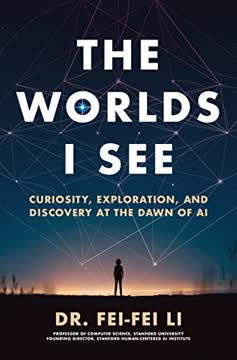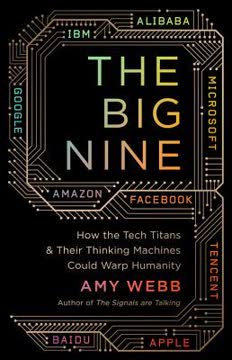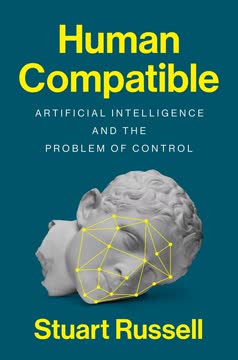Key Takeaways
1. Superminds: The Collective Intelligence of Human Groups
"The history of humanity is largely the history of human superminds, of how humans in groups—like hierarchies, communities, markets, and democracies—accomplished things that individual humans could never have done alone."
Superminds defined. A supermind is a group of individuals acting together in ways that seem intelligent. This concept extends beyond human groups to include combinations of people and computers. The intelligence of these superminds often surpasses that of individual members.
Historical perspective. Throughout history, human progress has been driven by collective efforts rather than individual achievements. From early hunting parties to modern corporations, superminds have been crucial in solving complex problems and advancing civilization.
Measuring collective intelligence. Research shows that group intelligence can be measured similarly to individual intelligence. Factors contributing to a group's collective intelligence include:
- Social perceptiveness of group members
- Equal distribution of conversational turn-taking
- Proportion of women in the group (correlated with higher social perceptiveness)
2. The Five Types of Superminds: Hierarchies, Markets, Communities, Democracies, and Ecosystems
"All these different types of superminds are constantly interacting: sometimes cooperating, sometimes competing, sometimes destroying each other altogether."
Hierarchies. Characterized by authority-based decision-making, hierarchies are common in businesses and governments. They excel at coordinating complex tasks but can be slow to adapt.
Markets. Based on mutual agreements between buyers and sellers, markets efficiently allocate resources but may ignore externalities.
Communities. Driven by shared norms and values, communities foster cooperation but can be limited in scale.
Democracies. Decision-making through voting allows for broad participation but can be time-consuming and may not always lead to optimal outcomes.
Ecosystems. The overarching supermind where all others interact, ecosystems operate on survival of the fittest principles.
3. Information Technology as a Catalyst for Smarter Superminds
"For a long time, the most important contribution of computers won't be artificial intelligence; it will be hyperconnectivity—connecting human minds to each other in new ways and at unprecedented scales."
Enhancing communication. Information technology dramatically reduces the cost and increases the speed of communication, allowing superminds to operate on a global scale.
Augmenting human capabilities. AI and other technologies can complement human skills, creating more effective cyber-human systems. Examples include:
- Prediction markets combining human insights with machine learning
- Online platforms like Climate CoLab for global problem-solving
- AI assistants in medical diagnosis and legal research
Challenges and opportunities. While AI raises concerns about job displacement, it also creates new roles and industries. The key is to focus on tasks where humans and machines can collaborate effectively.
4. Hyperspecialization: The New Division of Labor in the Digital Age
"Perhaps the most obvious way for groups to make decisions is to use the type of supermind we call a hierarchy."
Micro-tasks and global talent pools. Platforms like Amazon's Mechanical Turk enable the division of work into tiny, specialized tasks that can be performed by a global workforce.
Benefits and concerns. Hyperspecialization can lead to increased efficiency and access to global expertise. However, it also raises concerns about:
- Job security and worker rights
- Potential for creating "digital sweatshops"
- Loss of holistic understanding of tasks
Balancing specialization and integration. While hyperspecialization allows for deep expertise, successful superminds also need ways to integrate specialized knowledge into coherent solutions.
5. Cyber-Human Learning Loops: Continuous Improvement Through Collaboration
"Over time, computers would be able to do more of the work themselves."
Iterative learning process. Cyber-human learning loops involve:
- Humans performing tasks
- Computers recording and analyzing performance
- Algorithms suggesting improvements
- Humans implementing changes
- Repeating the cycle
Applications across industries. This approach can be applied in various fields:
- Medical diagnosis and treatment
- Legal research and case analysis
- Software development and debugging
- Manufacturing process optimization
Gradual automation. As the system learns, computers can take on more tasks, freeing humans to focus on higher-level problems and creativity.
6. The Global Mind: Our Interconnected Future
"The global mind isn't something that either exists or doesn't. Instead, like collective intelligence and superminds, it is a perspective—a way of looking at the world."
Emergence of global consciousness. As communication technologies advance, the interconnectedness of human knowledge and activity becomes more apparent, forming a kind of global mind.
Characteristics of the global mind:
- Rapid information sharing across the planet
- Collective problem-solving on a global scale
- Emergence of global norms and values
Challenges and opportunities. The global mind offers unprecedented potential for solving complex problems but also raises issues of:
- Privacy and data ownership
- Cultural homogenization
- Unequal access to information and resources
7. Balancing Progress and Ethics in the Age of Superminds
"Perhaps the most powerful way to influence the US Congress is to change the views of the voters who elect them."
Ethical considerations. As superminds become more powerful, important ethical questions arise:
- How to ensure fairness and inclusivity in decision-making?
- Who is responsible for the actions of AI-human collaborative systems?
- How to protect individual privacy while leveraging collective intelligence?
Shaping the future. The development of superminds is not predetermined. Individuals and societies can influence their direction through:
- Policy-making and regulation
- Education and public awareness
- Ethical design principles in technology development
Long-term perspective. While the immediate impacts of supermind technologies may be disruptive, the long-term potential for improving human welfare is significant. Balancing short-term concerns with long-term benefits is crucial for realizing the full potential of superminds.
Last updated:
FAQ
What's Superminds about?
- Collective Intelligence Focus: Superminds by Thomas W. Malone explores how groups of people and computers can solve problems more effectively than individuals. It examines various forms of collective intelligence, such as hierarchies, communities, markets, and democracies.
- Role of Technology: The book discusses how advancements in information technology enhance collective intelligence, allowing humans and computers to collaborate in unprecedented ways.
- Future Implications: Malone explores how these superminds can address global challenges like climate change and economic inequality by leveraging collective intelligence.
Why should I read Superminds?
- Understanding Modern Collaboration: The book provides insights into effective group collaboration in the digital age, highlighting the importance of collective intelligence in business and governance.
- Future-Proofing Knowledge: It prepares readers for future changes in work and collaboration, emphasizing the need to adapt to new forms involving both humans and machines.
- Practical Applications: Malone offers practical examples and case studies, demonstrating how collective intelligence can lead to innovative solutions for complex problems.
What are the key takeaways of Superminds?
- Definition of Superminds: A supermind is a group of individuals acting together intelligently, emphasizing collaboration and shared goals in achieving collective intelligence.
- Types of Superminds: The book categorizes superminds into hierarchies, democracies, markets, and communities, each with strengths and weaknesses in decision-making.
- Impact of Technology: Information technology significantly enhances superminds' capabilities, allowing smarter decision-making and more effective collaboration.
What are the best quotes from Superminds and what do they mean?
- "Supermind is a powerful combination of many individual minds.": This quote highlights the strength of collective intelligence, suggesting that collaboration can lead to outcomes surpassing individual efforts.
- "The intelligence of human groups—not individual humans—led to human success.": It underscores the importance of collective intelligence in achieving progress and solving complex problems.
- "Hyperconnectivity will allow humans and computers to work together.": This emphasizes the future potential of technology in enhancing collective intelligence, suggesting unprecedented problem-solving abilities.
How does Superminds define "collective intelligence"?
- Broad Definition: Collective intelligence is the shared or group intelligence emerging from collaboration and competition among individuals.
- Importance of Group Dynamics: It emphasizes that collective intelligence is not just the sum of individual intelligences but a unique property arising from effective collaboration.
- Measurement of Collective Intelligence: Malone discusses research showing that collective intelligence can be measured similarly to individual intelligence, indicating some groups are inherently smarter.
How can superminds make smarter decisions according to Superminds?
- Hierarchical Decision-Making: Hierarchies streamline decision-making by having authority figures make choices, leading to efficient outcomes but potentially lacking lower-level input.
- Democratic Participation: Democracies allow broader participation through voting, leading to more representative outcomes, depending on voters' knowledge and engagement.
- Market Mechanisms: Markets facilitate decision-making through mutual agreements, allowing efficient resource allocation and optimal outcomes under the right conditions.
What role do computers play in enhancing superminds in Superminds?
- Tools and Assistants: Computers enhance human capabilities by facilitating communication and collaboration, automating routine tasks, and allowing focus on complex decision-making.
- Peer Collaboration: In some cases, computers act as peers, participating in decision-making processes alongside humans, leading to more informed and accurate outcomes.
- Managerial Functions: Computers can take on managerial roles, coordinating tasks and optimizing workflows, increasing efficiency and effectiveness in achieving group goals.
What is the concept of "hyperspecialization" in Superminds?
- Definition of Hyperspecialization: It refers to individuals focusing on highly specialized tasks leveraging their unique skills, enhancing job satisfaction and productivity.
- Impact on the Workforce: Hyperspecialization leads to a more flexible and dynamic workforce, allowing individuals to choose tasks aligning with their interests and expertise.
- Global Collaboration: Hyperspecialized workers can collaborate globally, taking advantage of economies of scale, enabling groups to tackle complex problems more effectively.
How does Superminds address the issue of climate change?
- Collective Action for Solutions: Malone emphasizes the importance of collective intelligence in addressing climate change, suggesting superminds can develop innovative solutions.
- Climate CoLab Example: The book discusses the Climate CoLab project, which crowdsources ideas for climate action, exemplifying how diverse input leads to effective strategies.
- Role of Technology: Technology facilitates collaboration and data sharing among stakeholders working on climate change, helping implement solutions more effectively.
How does Superminds envision the future of work?
- Shift Towards Collaboration: Malone predicts increased collaboration between humans and machines, redefining job roles through the combination of human creativity and machine efficiency.
- Emergence of New Job Types: New job categories will emerge, particularly in areas requiring interpersonal skills and creativity, with the gig economy offering flexible opportunities.
- Focus on Lifelong Learning: Continuous learning and adaptation are crucial, with individuals needing to develop new skills to thrive in an ever-changing job landscape.
What is the significance of "self-selection" in task assignment within superminds?
- Empowerment of Workers: Self-selection allows individuals to choose tasks aligning with their skills and interests, leading to higher motivation and productivity.
- Increased Engagement: Autonomy in task selection leads to more engaged and satisfied workers, resulting in better outcomes for individuals and organizations.
- Examples of Self-Selection: Platforms like Topcoder and InnoCentive demonstrate the effectiveness of self-selection in harnessing collective intelligence.
How does Superminds suggest we can improve decision-making in superminds?
- Leveraging Technology: Using information technology enhances communication and collaboration within superminds, leading to more informed decision-making and better outcomes.
- Encouraging Participation: Involving more individuals in decision-making processes generates diverse ideas and solutions, achievable through crowdsourcing and online platforms.
- Creating Hybrid Systems: Combining human and machine intelligence leads to smarter decision-making, allowing superminds to tackle complex problems more effectively.
Review Summary
Superminds receives mixed reviews, with an average rating of 3.56/5. Readers appreciate its exploration of collective intelligence and human-computer interactions, finding some concepts thought-provoking. However, many criticize it for lacking originality, practical applications, and clear arguments. Some find it too broad or outdated, while others praise its insights on group decision-making and AI integration. The book's structure and writing style are points of contention, with some finding it engaging and others considering it repetitive or poorly written.
Similar Books








Download PDF
Download EPUB
.epub digital book format is ideal for reading ebooks on phones, tablets, and e-readers.




